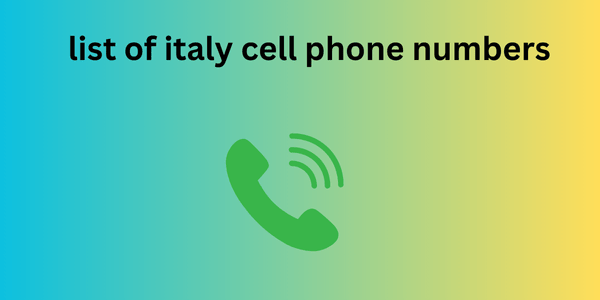including our primary keyword in the title tag
Marie Haynes, a talented SEO expert, wrote:
Anyone who knows anything about SEO knows that putting your keywords in your title tag is vital.
I know this article was published in 2016, but it was probably wrong then — just as it is now.
Note the word vital. Remember that vital is synonymous with necessary or essential. This means that Maria and many others argue that not including the keyword in your title tag is an SEO death sentence.
In other words, if you skip the keyword in the title list of italy cell phone numbers you won't rank.
Changing Someone's Mind
A wise man named Willy Brandt once wrote:
It often takes more courage to change one's mind than to keep one's mind.
Changing one's mind about something requires insight and effort, compared to stubbornly sticking to one's current opinion.
Obviously, you have no obligation to change your mind based on this blog post, but ask yourself this:
It often takes more courage to change one's mind than to keep one's mind.

We live in a world where data is increasingly available to help guide our decisions. Anecdotal experience is no longer enough, and the data is clear. There’s no reason to be completely driven by data – instead, be inspired by it.
A Decade of Insight About the Keyword in the Title
Where does this intuition come from?
It may come from experiments that prove that if you take two literally identical pages and add a meaningless keyword to the title tag of one of the pages, the page with the keyword in the title will beat the page without it - for the meaningless word.
But we don't know how much.
The winning page (with the keyword in its title) could potentially have won by as little as 0.0001 index points, or by a very large margin, and everything in between.
So it doesn't really help us - we don't know anything about the size of the effect!
Furthermore, the amount of data is sparse, so we know little about the stability of these findings – but it is fair to assume that the experiment can be easily replicated.
How to validate an idea?
Evidence-based SEO is about validating hypotheses like a physicist does. We just need less and/or worse evidence because we don’t need the same level of confidence.
However, we need some evidence.
Because there aren't many controlled experiments, we usually rely on correlational studies. Moreover, the controlled experiments that are actually done usually test a potential ranking factor in such an isolated way that they tell us almost nothing meaningful.
Correlation does not imply causation, and correlation studies are far from perfect. However, they are the best data we have for evaluating SEO initiatives.
In order to expand the data pool, I will present some results of a correlation study I conducted in Denmark.
Note: The study included 1,000 search queries with an average monthly search volume of 2,100 (all keywords have more than 1,000 monthly searches). I examined 67 different variables and compiled data for the first 50 search results for each search query. As a result, I ended up with over 3 million data points.
However, it seems fair to include all other correlation studies, etc., to create a more systematic examination of the "keyword in title" effect.
SearchMetrics has been producing ranking factor studies for several years. SEMRush also published a study in 2017. Brian Dean of Ahrefs and Backlinko also published a study in 2016.
Let's take a look at all these studies.
SEMRush ranked 20 factors from most important to least important. The keyword in the title was the second least important factor among the factors listed. But they didn’t list it as completely unimportant either.
Factors from important to not important listed by SEMRush
Brian Dean’s work can sometimes be a bit too populist for my taste. However, he often brings together great work. Congratulations Brian! His study was big, comprehensive, and well-designed, and found a correlation of 0.021 between the keyword in the title and rankings.
correlation between keyword in title and rank to be
This is very low and absolutely insignificant. After looking over his own data, Brian saw the light:
This finding shows that Google doesn't need to see the exact keyword in your title tag to understand the topic of your page.
SearchMetrics has been the authority on SEO correlation studies for nearly a decade. So why hasn’t anyone learned from their work? People talk about them, read them, share them, and supposedly learn from them. But everyone must be cherry-picking.
